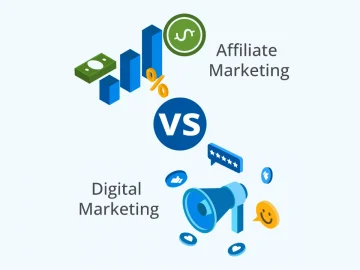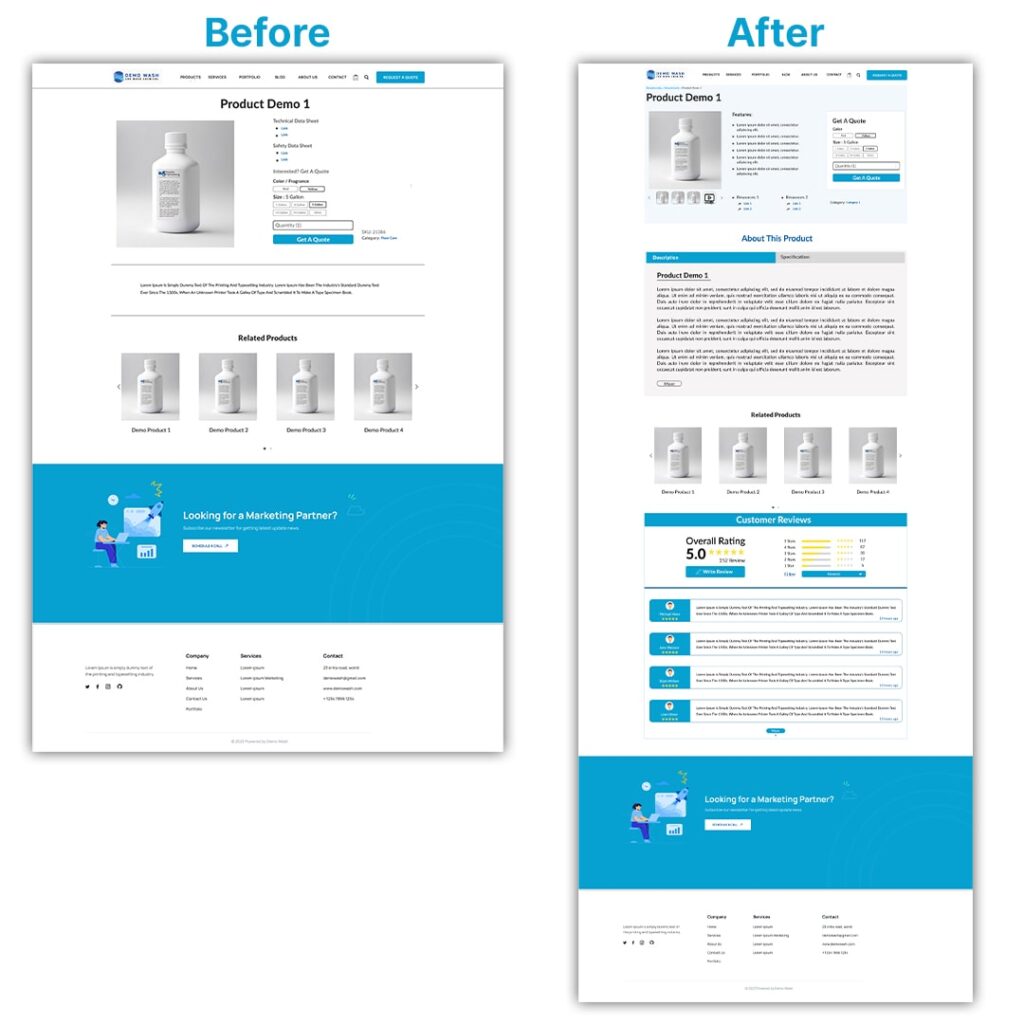Stuck between digital marketing vs affiliate marketing?
Well, it is totally normal to feel like that as whenever you will feel the urge to boost your brand online, you will for sure come across these two terms.
So, the million dollar question, which one is actually right for you?
Digital marketing covers everything from social media ads to email campaigns, letting you connect directly with your audience. Affiliate marketing, on the other hand, is all about teaming up with others to promote your product, letting their influence work for you.
Each has its perks, but the best choice really depends on what you want to achieve and how involved you want to be in the process. So, let’s break down each option between digital marketing vs affiliate marketing to see which path might give your business the edge!

What is Digital Marketing?
Digital marketing is a strategy for reaching and engaging customers through online channels, where most people spend a large part of their day. It includes tactics like social media marketing, search engine optimization (SEO), email marketing, content marketing, and paid advertising.
For instance, you own a small coffee shop. Now, with digital marketing, you could use social media to promote a new seasonal latte, targeting local coffee lovers who have shown interest in similar drinks.
You could also send an email to past customers with a special discount or even run a pay-per-click (PPC) ad that shows up when someone searches for “best coffee near me.” These strategies allow you to create a personalized experience for your audience, guiding them from learning about your shop to becoming regular customers.
After all, at the end of the day, it’s about meeting your audience where they are, on the devices they use every day, and keeping them engaged with your brand in a way that’s both effective and cost-efficient.

Understanding Affiliate Marketing
Affiliate marketing is a powerful way to boost your brand by partnering with individuals or other companies (called affiliates) who promote your products to their audience in exchange for a commission on each sale.
For example, let’s say you sell fitness equipment. Instead of handling all the marketing on your own, you could partner with a fitness influencer who shares a passion for health and has an engaged audience.
They could promote your products on their social media channels or blog, giving their followers a unique affiliate link to purchase directly. Whenever someone buys through that link, they get a commission, and you get a new customer.

Digital Marketing and Affiliate Marketing: Fundamental Discussion
Digital marketing and affiliate marketing may sound similar, but they have some key distinctions that set them apart. Digital marketing is a broad approach that covers a wide range of strategies to promote your brand directly, like social media ads, SEO, content marketing, and email campaigns.
The focus is on connecting directly with potential customers, building brand awareness, and driving engagement across various online platforms.
Affiliate marketing, on the other hand, is more about working with third-party affiliates—people or companies who promote your products to their own audiences for a commission on each sale they drive.
This approach leans heavily on partnerships and lets you tap into the affiliate’s existing network and credibility. For example, a popular lifestyle blogger might review your product and provide a unique link to their followers. When followers purchase through that link, the affiliate earns a commission, and you gain new customers without directly handling the promotion.
The main distinction? With digital marketing, you are hands-on, controlling every message and campaign detail. Affiliate marketing lets affiliates do the promoting, expanding your reach with minimal input.
Each approach has its strengths, so understanding these marketing distinctions between digital marketing vs affiliate marketing helps you decide which one aligns best with your goals and resources!

Digital Marketing vs Affiliate Marketing: Which is Best for You?
As always, choosing between digital marketing and affiliate marketing depends on your goals, resources, and how hands-on you want to be with your brand’s growth.
Both approaches have their strengths, but a quick comparison between digital vs affiliate marketing can help you see which one might be the better fit.
Digital marketing offers you full control over every campaign, whether you are running targeted ads on social media, optimizing your website for SEO, or engaging with customers through email.
It allows you to shape your brand’s messaging and interact directly with your audience, which is great for building a consistent brand image. However, it requires time, expertise, and often a larger budget to manage multiple campaigns and track their success.
Affiliate marketing, in contrast, lets you partner with affiliates—such as influencers or bloggers—who promote your product for a commission on sales they generate.
This approach is generally more cost-effective since you are only paying affiliates for actual results, rather than investing upfront in ads or content creation.
It’s an ideal choice if you are looking to reach new audiences with less direct involvement, leveraging the trust affiliates have already built with their followers.
So, in the digital marketing vs affiliate marketing comparison, the best choice comes down to what matters most to you: full control and brand-building with digital marketing, or expanded reach and cost-efficiency with affiliate marketing. Some businesses even find that combining both strategies gives them the perfect balance!
Pros and Cons of Digital Marketing
Digital marketing has fundamentally changed the way businesses engage with their customers, providing numerous advantages but also presenting some challenges.
Here’s a closer look at the pros and cons of digital marketing:

Pros of Digital Marketing
Digital marketing offers a range of advantages that make it an essential component of modern business strategy. Here are some of the key digital marketing pros:
● Direct Audience Connection: One of the standout advantages of digital marketing is the ability to connect directly with your target audience. Through platforms like social media, email, and search engines, you can engage with customers in real time – making it easier to understand and meet their needs.
● Full Control Over Messaging: With digital marketing, you have complete control over your brand’s messaging and how it is presented to the public. This means you can craft specific narratives (ads, blog posts, or social media updates) that align with your brand values and adjust them as necessary.
● Precise Targeting: Digital marketing tools provide incredible targeting capabilities. You can segment your audience based on demographics, interests, and online behaviors, allowing you to tailor your marketing messages to specific groups – ultimately leading to higher conversion rates.
● Real-Time Tracking and Analytics: With analytics tools, you can measure key metrics such as click-through rates, conversion rates, and user engagement. As a result, you can make informed decisions and adjust your strategies based on what is working and what isn’t, optimizing your campaigns for better results.
● Cost-Effective: Compared to traditional marketing methods, digital marketing is often more cost-effective. For example, running online ads can be more affordable than print or television ads. Additionally, you can adjust your investments based on performance without risking significant losses.
● Flexibility and Customization: Digital marketing strategies can be adjusted quickly in response to market trends or consumer feedback. Whether you want to change your ad spend, test a new type of content, or switch platforms, you can easily experiment with different approaches to see what resonates best with your audience.
Cons of Digital Marketing
Despite the numerous benefits, digital marketing also comes with its own set of challenges that businesses must navigate. They are as follows:
● Time-Intensive: While the potential for high returns exists, effective digital marketing often requires a significant investment of time. Developing a robust strategy, creating consistent content, engaging with your audience, and monitoring performance can be time-consuming. For small businesses with limited resources, this can pose a challenge.
● Higher Costs for Expertise: While digital marketing can be cost-effective in some areas, it may require specialized skills that not all businesses possess. Hiring or training staff to handle SEO, social media management, or data analysis can lead to increased operational costs.
● Constantly Evolving Trends: What works today may not work tomorrow, and businesses must stay on top of these shifts to maintain effectiveness. This constant evolution can make it challenging for marketers to keep up, leading to the risk of falling behind competitors.
● Information Overload: With so much data available, it can be overwhelming for businesses to sift through and determine what information is most relevant. This information overload can lead to decision paralysis, where marketers struggle to make informed choices due to the sheer volume of metrics and reports available.
● Ad Fatigue: Digital consumers are bombarded with ads daily, leading to ad fatigue. This phenomenon can reduce the effectiveness of campaigns over time, as audiences become desensitized to marketing messages. Finding fresh, engaging ways to capture attention can be a continual challenge.
● Potential for Negative Feedback: While direct interaction with customers can be beneficial, it also means that negative feedback or reviews can quickly surface. Such as, if a customer has a poor experience, they can share it publicly, which can damage your brand’s reputation.
Advantages and Drawbacks of Affiliate Marketing
Affiliate marketing has gained significant popularity in recent years, offering a unique way for businesses to promote their products while allowing individuals to earn commissions for driving sales. However, like any marketing strategy, they have their own sets of strengths and weaknesses.

Advantages of Affiliate Marketing
Affiliate marketing offers a unique blend of benefits that can significantly enhance both businesses and individuals looking to generate income.
Here are some crucial advantages that make affiliate marketing an appealing choice:
● Cost-Effective Approach: Brands typically pay affiliates a commission only when a sale is made or a specific action is completed (like a lead generation). This performance-based model minimizes upfront costs and reduces the financial risk associated with traditional advertising methods, where you might pay upfront without any guarantee of results.
● Expanded Reach and Audience Access: Affiliates often have established audiences with whom they have built trust. By partnering with these affiliates, brands can tap into new markets and reach potential customers that they might not be able to connect with through their own marketing efforts. This expanded reach can lead to increased brand visibility and awareness, helping businesses grow their customer base more quickly.
● Less Management and Overhead: Once an affiliate program is set up, the affiliates are responsible for much of the marketing and promotion. This means that businesses can focus on their core activities—like product development and customer service—while affiliates handle the promotion.
● Diverse Marketing Channels: Affiliates employ a variety of marketing strategies, including social media, email marketing, content creation, and even paid advertising. This diversity allows businesses to benefit from multiple marketing channels simultaneously without having to manage each one individually.
● Performance Tracking and Analytics: Many affiliate marketing programs come with robust tracking tools that allow businesses to monitor performance metrics in real time. This data can provide insights into which affiliates are generating the most sales, which products are popular, and which marketing strategies are most effective.
● Scalability: As a business grows, it can easily scale its affiliate marketing efforts by onboarding more affiliates or expanding the commission structure. This scalability makes affiliate marketing a versatile option for businesses of all sizes, from startups to large enterprises, as they can adjust their strategies based on their evolving needs.
Drawbacks of Affiliate Marketing
While affiliate marketing presents numerous advantages, it also comes with its share of challenges. Here are some key drawbacks that businesses should consider:
● Limited Control Over Brand Representation: When you partner with affiliates, you give them a certain level of control over how your brand is represented. While this can be beneficial, it also poses certain risks – negatively impacting your brand’s reputation.
● Potential for Misalignment: Choosing the right affiliates is super essential for success. If affiliates do not resonate with your target audience or promote your products inappropriately, it can lead to poor conversion rates and wasted resources. Misalignment can occur if affiliates target the wrong demographics or fail to communicate the benefits of your products effectively.
● Commission Costs: While affiliate marketing is cost-effective in many ways, commission payouts can add up, especially if your program scales rapidly. Hence, if your affiliates are driving substantial sales, your commission costs can become significant.
● Dependency on Affiliates: If key affiliates choose to stop promoting your products, or if they shift their focus elsewhere, your sales can be adversely affected. Hence, it’s essential to diversify your affiliate network to mitigate this risk and not become overly reliant on a handful of partners.
● Complexity in Managing Programs: While affiliate marketing can be hands-off once set up, managing an affiliate program effectively requires ongoing attention. This includes onboarding new affiliates, providing them with marketing materials, tracking their performance, and ensuring compliance with brand standards.
● Potential for Fraud: Some affiliates might engage in deceptive practices, such as generating fake leads or clicks, which can lead to inflated costs for businesses. Therefore, implementing robust fraud detection measures is essential to protect your investment and maintain the integrity of your affiliate program.

Tips for Monetizing and Generating Revenue in Marketing
Marketing revenue generation isn’t just about throwing money at ads and hoping for the best. It requires strategic thinking and creativity.
Below are some monetization tips in terms of digital marketing vs affiliate marketing to help you maximize your marketing efforts and boost your bottom line:
● Leverage Email Marketing: Build and nurture an email list to reach your audience directly. Use it to share promotions, exclusive content, and updates, encouraging conversions. Personalized emails can significantly increase engagement and drive sales.
● Invest in Quality Content: Create valuable and relevant content that resonates with your audience. High-quality blogs, videos, and infographics can establish your authority and attract organic traffic, leading to more opportunities for monetization through ads, affiliate links, or product sales.
● Utilize Social Media Effectively: Don’t just post; engage! Use social media to interact with your audience, run contests, and share user-generated content. Platforms like Instagram and Facebook can be excellent for promoting products or services directly to your followers.
● Optimize for SEO: Ensure your website is optimized for search engines. This will help improve your organic visibility and attract more traffic. Higher visibility means more potential customers, which can lead to increased sales.
● Consider Affiliate Marketing: If you have a strong online presence, consider joining affiliate programs. Promote relevant products or services to your audience, earning commissions for sales generated through your referrals. It’s a great way to monetize your platform without the overhead of creating your own products.
● Offer Paid Memberships or Subscriptions: If you provide exclusive content or services, consider offering a paid membership model. This can create a steady revenue stream while providing your audience with valuable resources.
● Analyze and Adjust: Regularly review your marketing efforts using analytics tools. Identify what’s working and what’s not, and be willing to pivot your strategy. After all, continuous improvement is the ultimate weapon to maximizing revenue generation.
The Future of Digital and Affiliate Marketing
As we look ahead at digital marketing vs affiliate marketing, both of them are set to evolve in exciting ways. And understanding upcoming trends can help businesses stay ahead of the curve and make informed decisions.
So, here are some key affiliate and digital marketing trends shaping the future:

Increased Personalization
Consumers expect a tailored experience, and brands are stepping up to deliver it.
From personalized emails to targeted ads based on user behavior, marketing strategies that focus on individual preferences will become more prominent. Brands that can create relevant, personalized content are more likely to create deeper customer connections and loyalty.
Influencer Marketing Evolution
The influencer marketing space is maturing, moving beyond just follower counts to prioritize authenticity and engagement.
Micro-influencers—those with smaller but highly engaged audiences—are becoming increasingly valuable for brands. They tend to have a more loyal following, which can lead to better conversion rates.
Artificial Intelligence and Automation
AI tools are revolutionizing how businesses approach marketing.
From chatbots that enhance customer service to data analytics that predict consumer behavior, AI and automation will play a crucial role in optimizing marketing efforts. This technology allows marketers to save time, reduce costs, and enhance their strategies.
Video Content Dominance
Video continues to dominate digital marketing, with platforms like TikTok and Instagram Reels gaining popularity. Brands that utilize engaging video content will find increased engagement and reach. Short, catchy videos that tell a story or highlight product features can be particularly effective.
Affiliate Marketing Growth
The affiliate marketing model is set to grow as more brands recognize its value in driving sales.
With the rise of e-commerce and online shopping, partnering with affiliates who can reach niche markets will become a vital strategy for brands looking to expand their reach without significant upfront costs.
Sustainability and Ethical Marketing
Consumers are increasingly prioritizing brands that demonstrate social responsibility and sustainability. For instance, digital marketing strategies that highlight ethical practices and commitment to the environment will be able to resonate more with conscious consumers.

Conclusion
That’s all regarding digital marketing vs affiliate marketing!
And when it comes to choosing between digital marketing vs affiliate marketing, this ultimately comes down to what aligns best with your business’s goals.
For example, digital marketing gives you full control over your brand’s messaging and allows for direct engagement with customers.
On the other hand, affiliate marketing enables you to reach new audiences through trusted promoters without heavy upfront costs. So, whether you decide to focus on one or integrate both strategies, understanding their strengths and what works for you will indeed help you make an informed decision – driving desired outcomes!








